Healthcare Discussion: Nursing Research, Obesity, and Nurse Shortage
VerifiedAdded on 2023/01/20
|7
|1661
|64
Discussion Board Post
AI Summary
This discussion board post explores crucial aspects of healthcare, including the significance of nursing research, the challenges posed by obesity as a chronic health issue, and the impact of nurse shortages. The assignment delves into the essentials of nursing research, highlighting literature reviews, methodology, data analysis, results, and future scope. It analyzes the selection criteria for participants in obesity-related studies, emphasizing the role of nurses in establishing therapeutic relationships and providing holistic care. Furthermore, the post addresses the shortage of nursing professionals, discussing contributing factors and potential solutions, such as improved work organization, job satisfaction, and teamwork. Finally, it examines the evolution and principles of nurse practitioners, showcasing their role in enhancing patient care and healthcare outcomes. The post references key studies and principles to support the discussions.
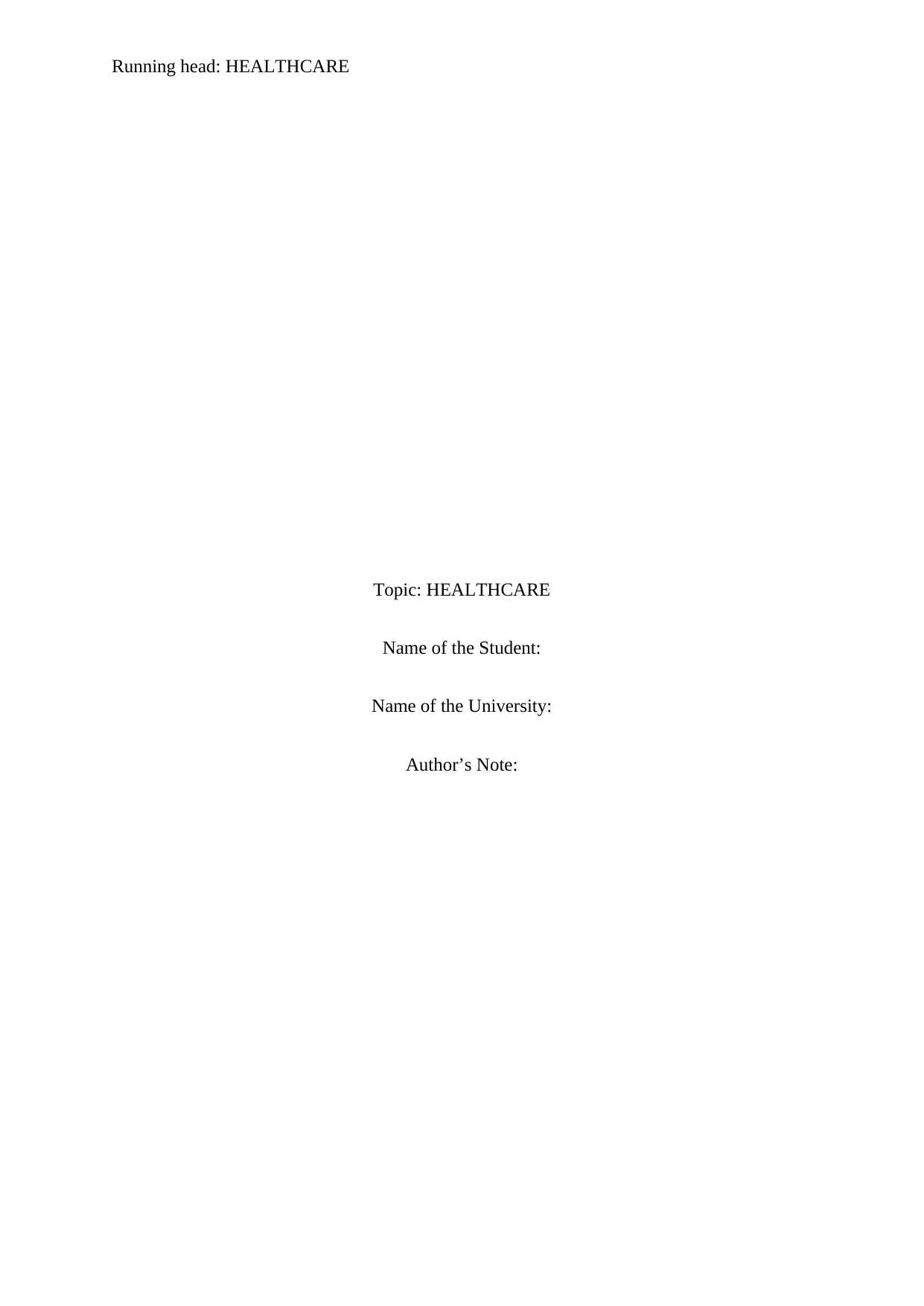
Running head: HEALTHCARE
Topic: HEALTHCARE
Name of the Student:
Name of the University:
Author’s Note:
Topic: HEALTHCARE
Name of the Student:
Name of the University:
Author’s Note:
Paraphrase This Document
Need a fresh take? Get an instant paraphrase of this document with our AI Paraphraser
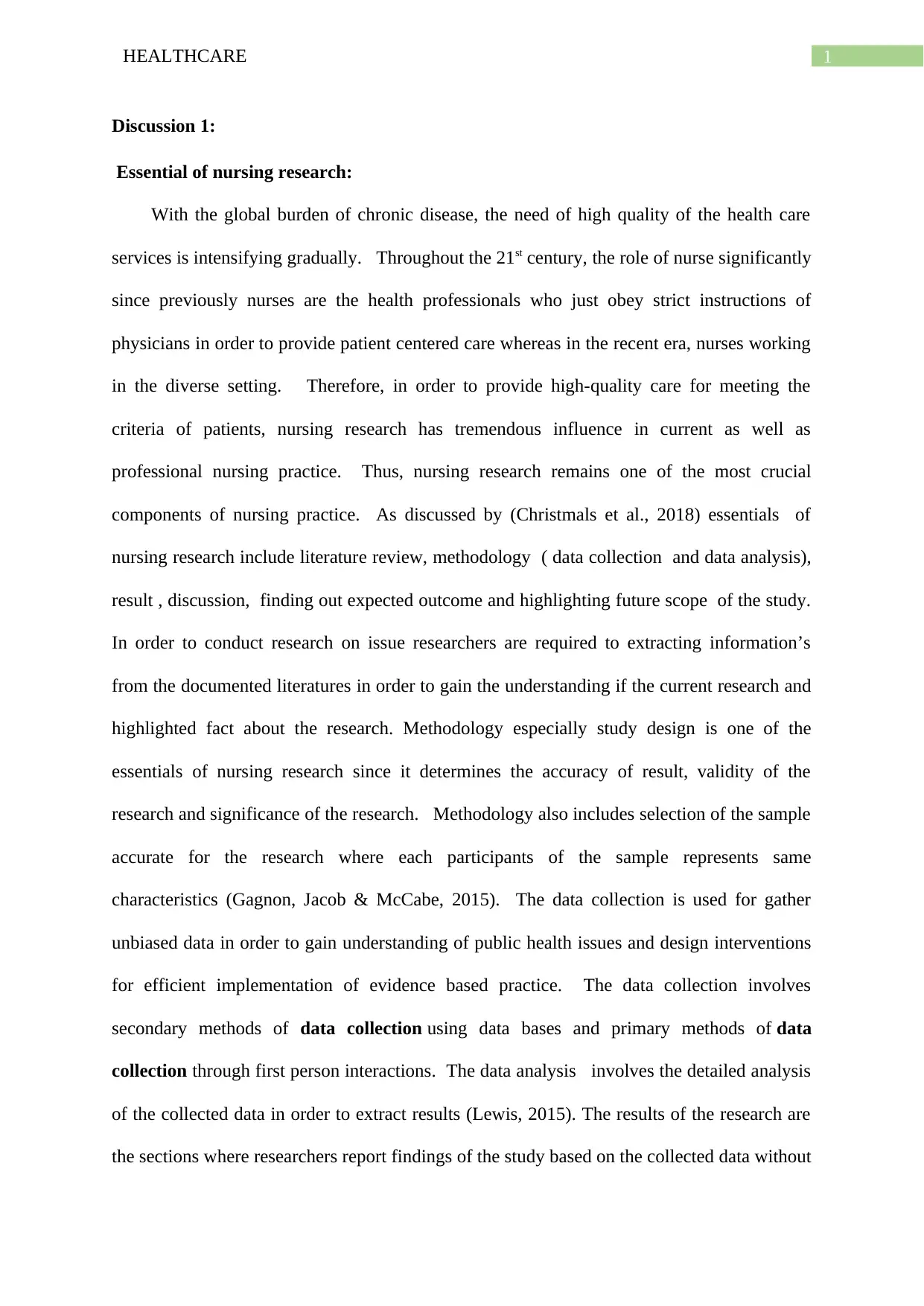
1HEALTHCARE
Discussion 1:
Essential of nursing research:
With the global burden of chronic disease, the need of high quality of the health care
services is intensifying gradually. Throughout the 21st century, the role of nurse significantly
since previously nurses are the health professionals who just obey strict instructions of
physicians in order to provide patient centered care whereas in the recent era, nurses working
in the diverse setting. Therefore, in order to provide high-quality care for meeting the
criteria of patients, nursing research has tremendous influence in current as well as
professional nursing practice. Thus, nursing research remains one of the most crucial
components of nursing practice. As discussed by (Christmals et al., 2018) essentials of
nursing research include literature review, methodology ( data collection and data analysis),
result , discussion, finding out expected outcome and highlighting future scope of the study.
In order to conduct research on issue researchers are required to extracting information’s
from the documented literatures in order to gain the understanding if the current research and
highlighted fact about the research. Methodology especially study design is one of the
essentials of nursing research since it determines the accuracy of result, validity of the
research and significance of the research. Methodology also includes selection of the sample
accurate for the research where each participants of the sample represents same
characteristics (Gagnon, Jacob & McCabe, 2015). The data collection is used for gather
unbiased data in order to gain understanding of public health issues and design interventions
for efficient implementation of evidence based practice. The data collection involves
secondary methods of data collection using data bases and primary methods of data
collection through first person interactions. The data analysis involves the detailed analysis
of the collected data in order to extract results (Lewis, 2015). The results of the research are
the sections where researchers report findings of the study based on the collected data without
Discussion 1:
Essential of nursing research:
With the global burden of chronic disease, the need of high quality of the health care
services is intensifying gradually. Throughout the 21st century, the role of nurse significantly
since previously nurses are the health professionals who just obey strict instructions of
physicians in order to provide patient centered care whereas in the recent era, nurses working
in the diverse setting. Therefore, in order to provide high-quality care for meeting the
criteria of patients, nursing research has tremendous influence in current as well as
professional nursing practice. Thus, nursing research remains one of the most crucial
components of nursing practice. As discussed by (Christmals et al., 2018) essentials of
nursing research include literature review, methodology ( data collection and data analysis),
result , discussion, finding out expected outcome and highlighting future scope of the study.
In order to conduct research on issue researchers are required to extracting information’s
from the documented literatures in order to gain the understanding if the current research and
highlighted fact about the research. Methodology especially study design is one of the
essentials of nursing research since it determines the accuracy of result, validity of the
research and significance of the research. Methodology also includes selection of the sample
accurate for the research where each participants of the sample represents same
characteristics (Gagnon, Jacob & McCabe, 2015). The data collection is used for gather
unbiased data in order to gain understanding of public health issues and design interventions
for efficient implementation of evidence based practice. The data collection involves
secondary methods of data collection using data bases and primary methods of data
collection through first person interactions. The data analysis involves the detailed analysis
of the collected data in order to extract results (Lewis, 2015). The results of the research are
the sections where researchers report findings of the study based on the collected data without
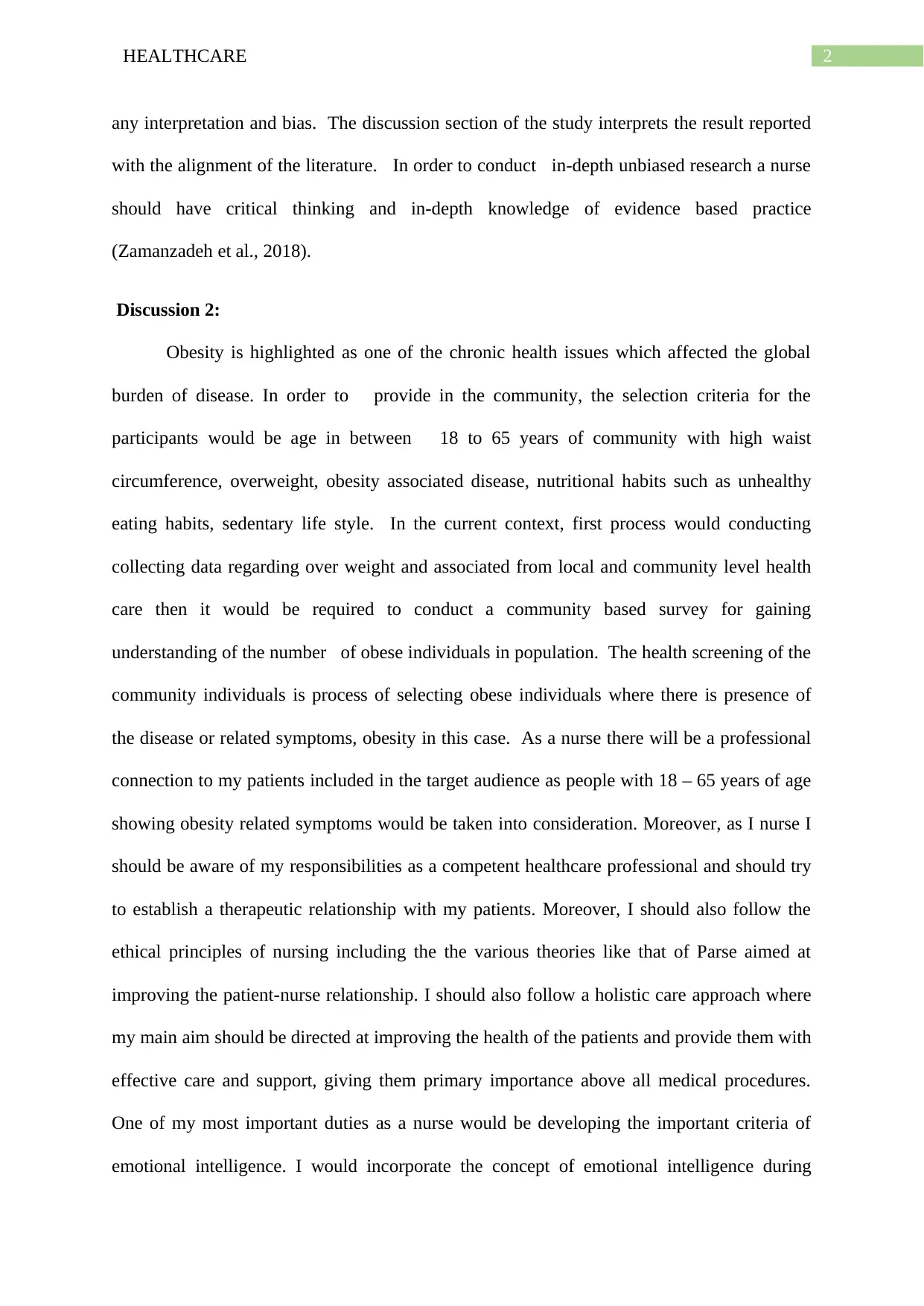
2HEALTHCARE
any interpretation and bias. The discussion section of the study interprets the result reported
with the alignment of the literature. In order to conduct in-depth unbiased research a nurse
should have critical thinking and in-depth knowledge of evidence based practice
(Zamanzadeh et al., 2018).
Discussion 2:
Obesity is highlighted as one of the chronic health issues which affected the global
burden of disease. In order to provide in the community, the selection criteria for the
participants would be age in between 18 to 65 years of community with high waist
circumference, overweight, obesity associated disease, nutritional habits such as unhealthy
eating habits, sedentary life style. In the current context, first process would conducting
collecting data regarding over weight and associated from local and community level health
care then it would be required to conduct a community based survey for gaining
understanding of the number of obese individuals in population. The health screening of the
community individuals is process of selecting obese individuals where there is presence of
the disease or related symptoms, obesity in this case. As a nurse there will be a professional
connection to my patients included in the target audience as people with 18 – 65 years of age
showing obesity related symptoms would be taken into consideration. Moreover, as I nurse I
should be aware of my responsibilities as a competent healthcare professional and should try
to establish a therapeutic relationship with my patients. Moreover, I should also follow the
ethical principles of nursing including the the various theories like that of Parse aimed at
improving the patient-nurse relationship. I should also follow a holistic care approach where
my main aim should be directed at improving the health of the patients and provide them with
effective care and support, giving them primary importance above all medical procedures.
One of my most important duties as a nurse would be developing the important criteria of
emotional intelligence. I would incorporate the concept of emotional intelligence during
any interpretation and bias. The discussion section of the study interprets the result reported
with the alignment of the literature. In order to conduct in-depth unbiased research a nurse
should have critical thinking and in-depth knowledge of evidence based practice
(Zamanzadeh et al., 2018).
Discussion 2:
Obesity is highlighted as one of the chronic health issues which affected the global
burden of disease. In order to provide in the community, the selection criteria for the
participants would be age in between 18 to 65 years of community with high waist
circumference, overweight, obesity associated disease, nutritional habits such as unhealthy
eating habits, sedentary life style. In the current context, first process would conducting
collecting data regarding over weight and associated from local and community level health
care then it would be required to conduct a community based survey for gaining
understanding of the number of obese individuals in population. The health screening of the
community individuals is process of selecting obese individuals where there is presence of
the disease or related symptoms, obesity in this case. As a nurse there will be a professional
connection to my patients included in the target audience as people with 18 – 65 years of age
showing obesity related symptoms would be taken into consideration. Moreover, as I nurse I
should be aware of my responsibilities as a competent healthcare professional and should try
to establish a therapeutic relationship with my patients. Moreover, I should also follow the
ethical principles of nursing including the the various theories like that of Parse aimed at
improving the patient-nurse relationship. I should also follow a holistic care approach where
my main aim should be directed at improving the health of the patients and provide them with
effective care and support, giving them primary importance above all medical procedures.
One of my most important duties as a nurse would be developing the important criteria of
emotional intelligence. I would incorporate the concept of emotional intelligence during
⊘ This is a preview!⊘
Do you want full access?
Subscribe today to unlock all pages.

Trusted by 1+ million students worldwide
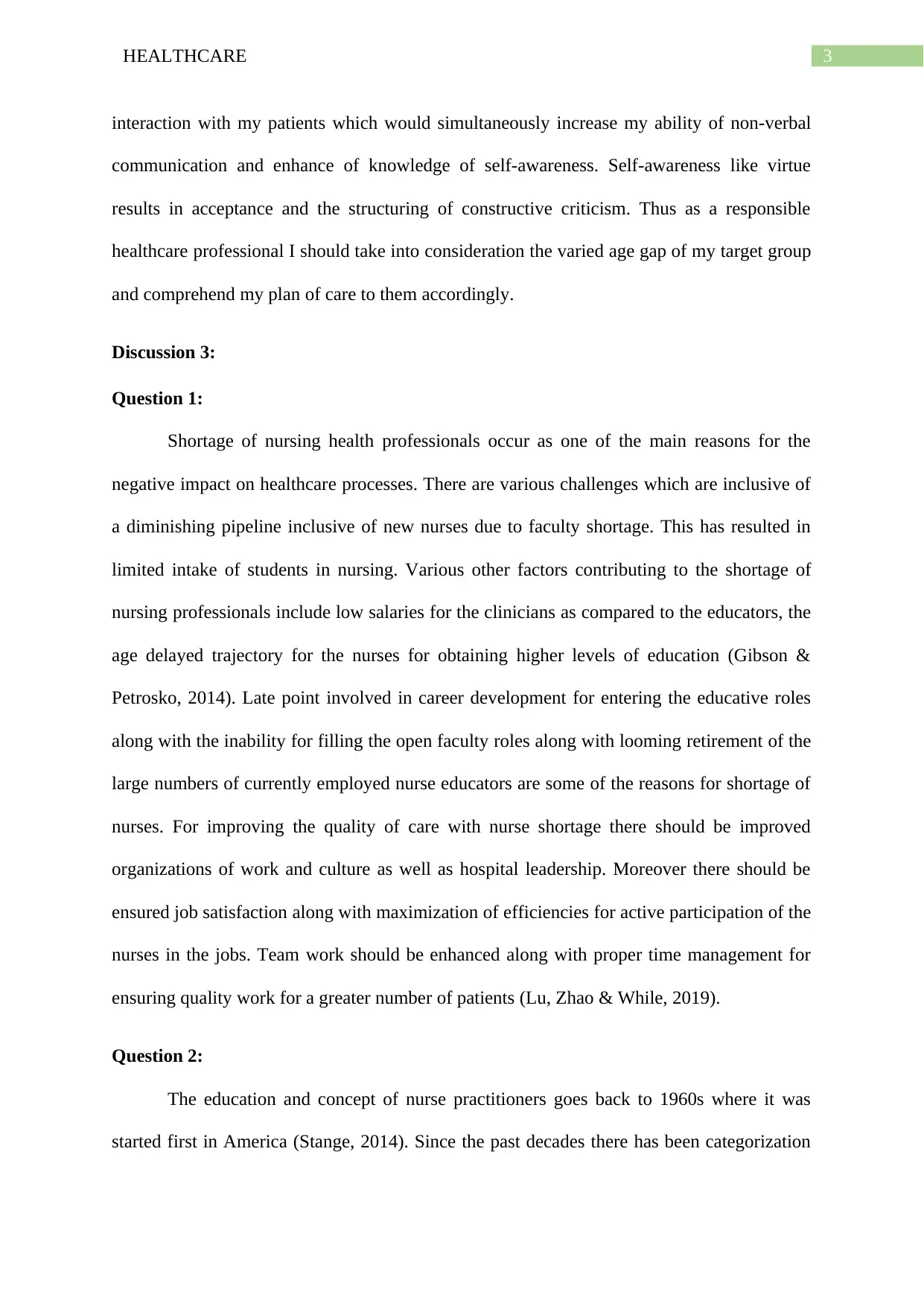
3HEALTHCARE
interaction with my patients which would simultaneously increase my ability of non-verbal
communication and enhance of knowledge of self-awareness. Self-awareness like virtue
results in acceptance and the structuring of constructive criticism. Thus as a responsible
healthcare professional I should take into consideration the varied age gap of my target group
and comprehend my plan of care to them accordingly.
Discussion 3:
Question 1:
Shortage of nursing health professionals occur as one of the main reasons for the
negative impact on healthcare processes. There are various challenges which are inclusive of
a diminishing pipeline inclusive of new nurses due to faculty shortage. This has resulted in
limited intake of students in nursing. Various other factors contributing to the shortage of
nursing professionals include low salaries for the clinicians as compared to the educators, the
age delayed trajectory for the nurses for obtaining higher levels of education (Gibson &
Petrosko, 2014). Late point involved in career development for entering the educative roles
along with the inability for filling the open faculty roles along with looming retirement of the
large numbers of currently employed nurse educators are some of the reasons for shortage of
nurses. For improving the quality of care with nurse shortage there should be improved
organizations of work and culture as well as hospital leadership. Moreover there should be
ensured job satisfaction along with maximization of efficiencies for active participation of the
nurses in the jobs. Team work should be enhanced along with proper time management for
ensuring quality work for a greater number of patients (Lu, Zhao & While, 2019).
Question 2:
The education and concept of nurse practitioners goes back to 1960s where it was
started first in America (Stange, 2014). Since the past decades there has been categorization
interaction with my patients which would simultaneously increase my ability of non-verbal
communication and enhance of knowledge of self-awareness. Self-awareness like virtue
results in acceptance and the structuring of constructive criticism. Thus as a responsible
healthcare professional I should take into consideration the varied age gap of my target group
and comprehend my plan of care to them accordingly.
Discussion 3:
Question 1:
Shortage of nursing health professionals occur as one of the main reasons for the
negative impact on healthcare processes. There are various challenges which are inclusive of
a diminishing pipeline inclusive of new nurses due to faculty shortage. This has resulted in
limited intake of students in nursing. Various other factors contributing to the shortage of
nursing professionals include low salaries for the clinicians as compared to the educators, the
age delayed trajectory for the nurses for obtaining higher levels of education (Gibson &
Petrosko, 2014). Late point involved in career development for entering the educative roles
along with the inability for filling the open faculty roles along with looming retirement of the
large numbers of currently employed nurse educators are some of the reasons for shortage of
nurses. For improving the quality of care with nurse shortage there should be improved
organizations of work and culture as well as hospital leadership. Moreover there should be
ensured job satisfaction along with maximization of efficiencies for active participation of the
nurses in the jobs. Team work should be enhanced along with proper time management for
ensuring quality work for a greater number of patients (Lu, Zhao & While, 2019).
Question 2:
The education and concept of nurse practitioners goes back to 1960s where it was
started first in America (Stange, 2014). Since the past decades there has been categorization
Paraphrase This Document
Need a fresh take? Get an instant paraphrase of this document with our AI Paraphraser
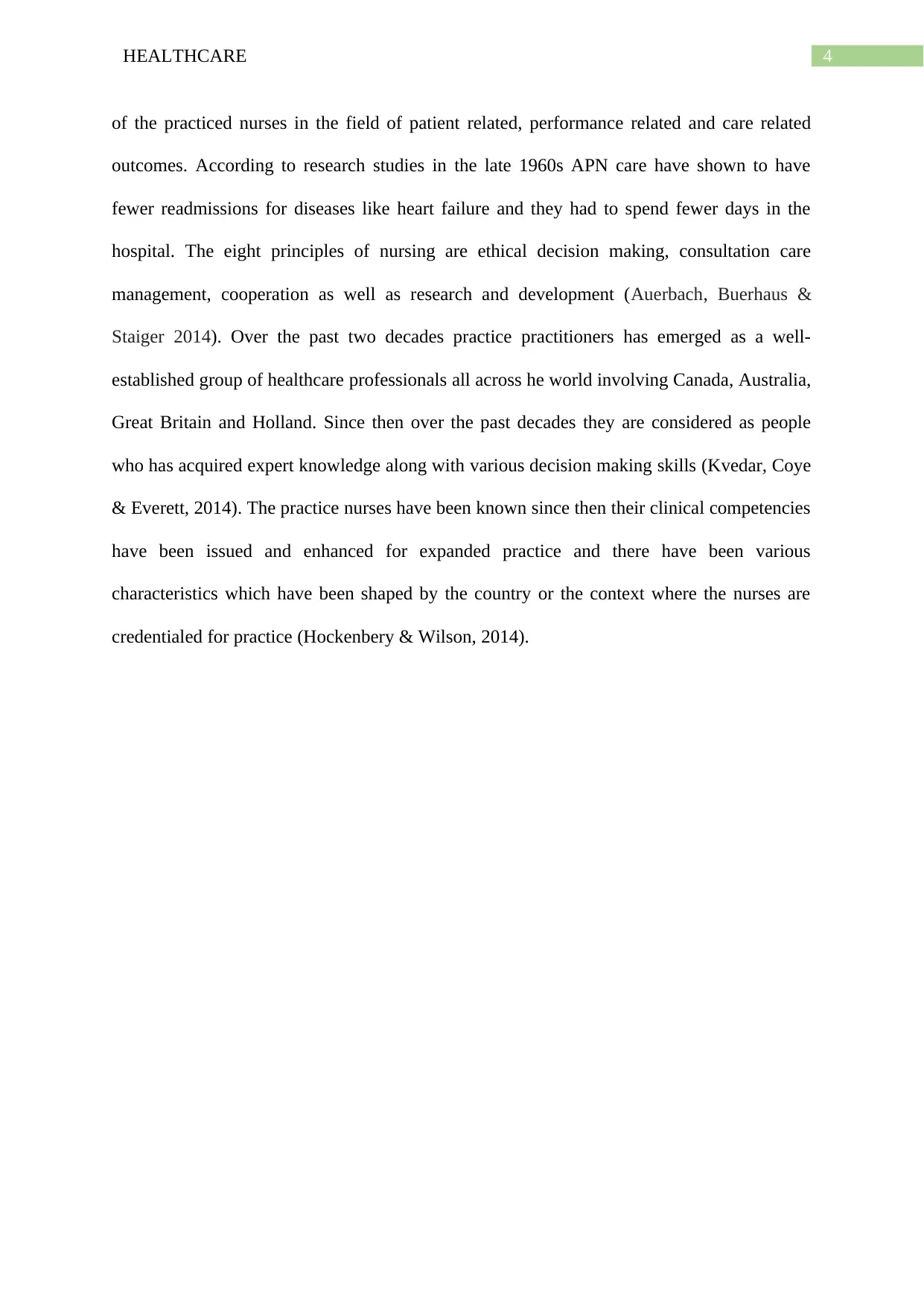
4HEALTHCARE
of the practiced nurses in the field of patient related, performance related and care related
outcomes. According to research studies in the late 1960s APN care have shown to have
fewer readmissions for diseases like heart failure and they had to spend fewer days in the
hospital. The eight principles of nursing are ethical decision making, consultation care
management, cooperation as well as research and development (Auerbach, Buerhaus &
Staiger 2014). Over the past two decades practice practitioners has emerged as a well-
established group of healthcare professionals all across he world involving Canada, Australia,
Great Britain and Holland. Since then over the past decades they are considered as people
who has acquired expert knowledge along with various decision making skills (Kvedar, Coye
& Everett, 2014). The practice nurses have been known since then their clinical competencies
have been issued and enhanced for expanded practice and there have been various
characteristics which have been shaped by the country or the context where the nurses are
credentialed for practice (Hockenbery & Wilson, 2014).
of the practiced nurses in the field of patient related, performance related and care related
outcomes. According to research studies in the late 1960s APN care have shown to have
fewer readmissions for diseases like heart failure and they had to spend fewer days in the
hospital. The eight principles of nursing are ethical decision making, consultation care
management, cooperation as well as research and development (Auerbach, Buerhaus &
Staiger 2014). Over the past two decades practice practitioners has emerged as a well-
established group of healthcare professionals all across he world involving Canada, Australia,
Great Britain and Holland. Since then over the past decades they are considered as people
who has acquired expert knowledge along with various decision making skills (Kvedar, Coye
& Everett, 2014). The practice nurses have been known since then their clinical competencies
have been issued and enhanced for expanded practice and there have been various
characteristics which have been shaped by the country or the context where the nurses are
credentialed for practice (Hockenbery & Wilson, 2014).
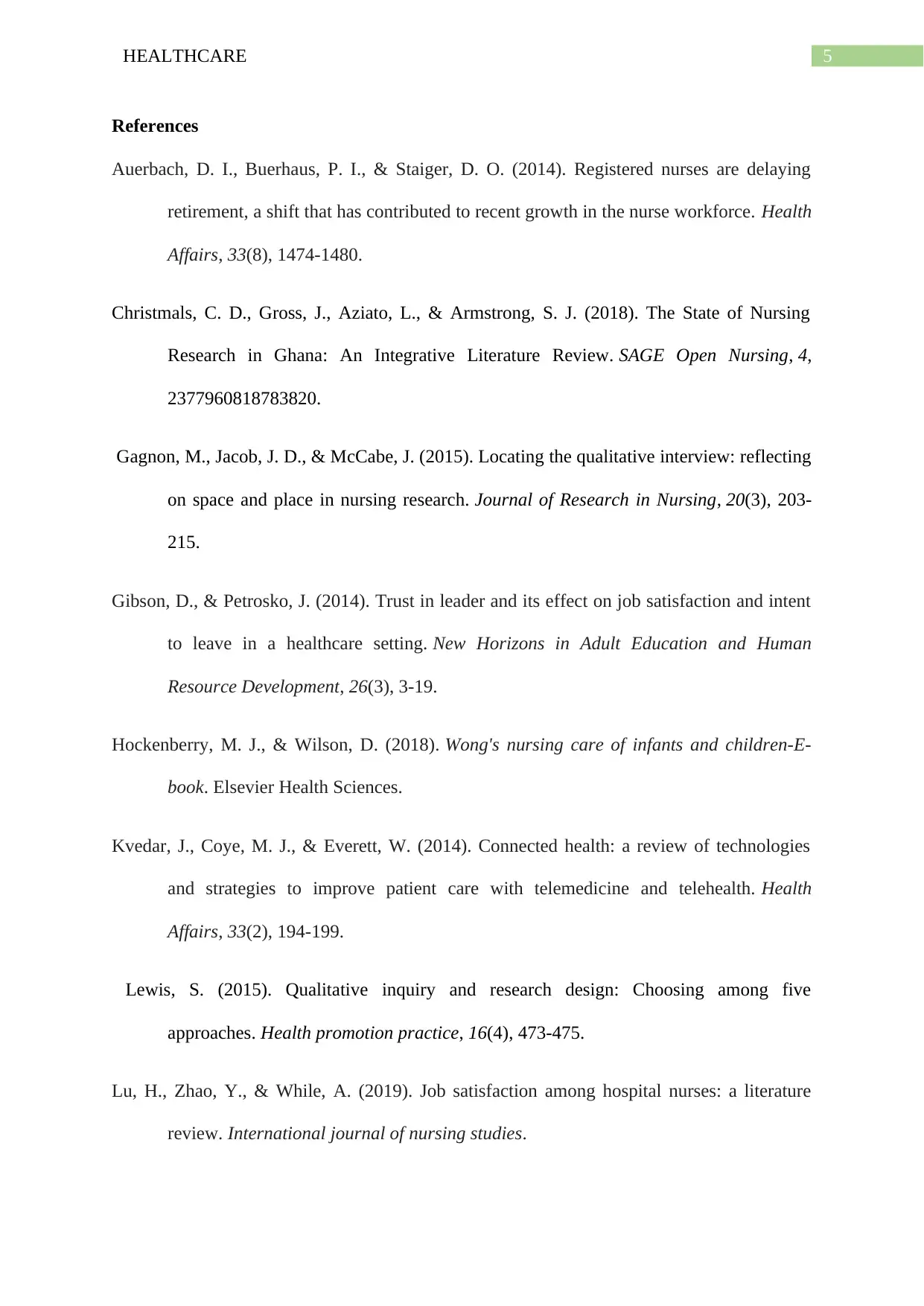
5HEALTHCARE
References
Auerbach, D. I., Buerhaus, P. I., & Staiger, D. O. (2014). Registered nurses are delaying
retirement, a shift that has contributed to recent growth in the nurse workforce. Health
Affairs, 33(8), 1474-1480.
Christmals, C. D., Gross, J., Aziato, L., & Armstrong, S. J. (2018). The State of Nursing
Research in Ghana: An Integrative Literature Review. SAGE Open Nursing, 4,
2377960818783820.
Gagnon, M., Jacob, J. D., & McCabe, J. (2015). Locating the qualitative interview: reflecting
on space and place in nursing research. Journal of Research in Nursing, 20(3), 203-
215.
Gibson, D., & Petrosko, J. (2014). Trust in leader and its effect on job satisfaction and intent
to leave in a healthcare setting. New Horizons in Adult Education and Human
Resource Development, 26(3), 3-19.
Hockenberry, M. J., & Wilson, D. (2018). Wong's nursing care of infants and children-E-
book. Elsevier Health Sciences.
Kvedar, J., Coye, M. J., & Everett, W. (2014). Connected health: a review of technologies
and strategies to improve patient care with telemedicine and telehealth. Health
Affairs, 33(2), 194-199.
Lewis, S. (2015). Qualitative inquiry and research design: Choosing among five
approaches. Health promotion practice, 16(4), 473-475.
Lu, H., Zhao, Y., & While, A. (2019). Job satisfaction among hospital nurses: a literature
review. International journal of nursing studies.
References
Auerbach, D. I., Buerhaus, P. I., & Staiger, D. O. (2014). Registered nurses are delaying
retirement, a shift that has contributed to recent growth in the nurse workforce. Health
Affairs, 33(8), 1474-1480.
Christmals, C. D., Gross, J., Aziato, L., & Armstrong, S. J. (2018). The State of Nursing
Research in Ghana: An Integrative Literature Review. SAGE Open Nursing, 4,
2377960818783820.
Gagnon, M., Jacob, J. D., & McCabe, J. (2015). Locating the qualitative interview: reflecting
on space and place in nursing research. Journal of Research in Nursing, 20(3), 203-
215.
Gibson, D., & Petrosko, J. (2014). Trust in leader and its effect on job satisfaction and intent
to leave in a healthcare setting. New Horizons in Adult Education and Human
Resource Development, 26(3), 3-19.
Hockenberry, M. J., & Wilson, D. (2018). Wong's nursing care of infants and children-E-
book. Elsevier Health Sciences.
Kvedar, J., Coye, M. J., & Everett, W. (2014). Connected health: a review of technologies
and strategies to improve patient care with telemedicine and telehealth. Health
Affairs, 33(2), 194-199.
Lewis, S. (2015). Qualitative inquiry and research design: Choosing among five
approaches. Health promotion practice, 16(4), 473-475.
Lu, H., Zhao, Y., & While, A. (2019). Job satisfaction among hospital nurses: a literature
review. International journal of nursing studies.
⊘ This is a preview!⊘
Do you want full access?
Subscribe today to unlock all pages.

Trusted by 1+ million students worldwide
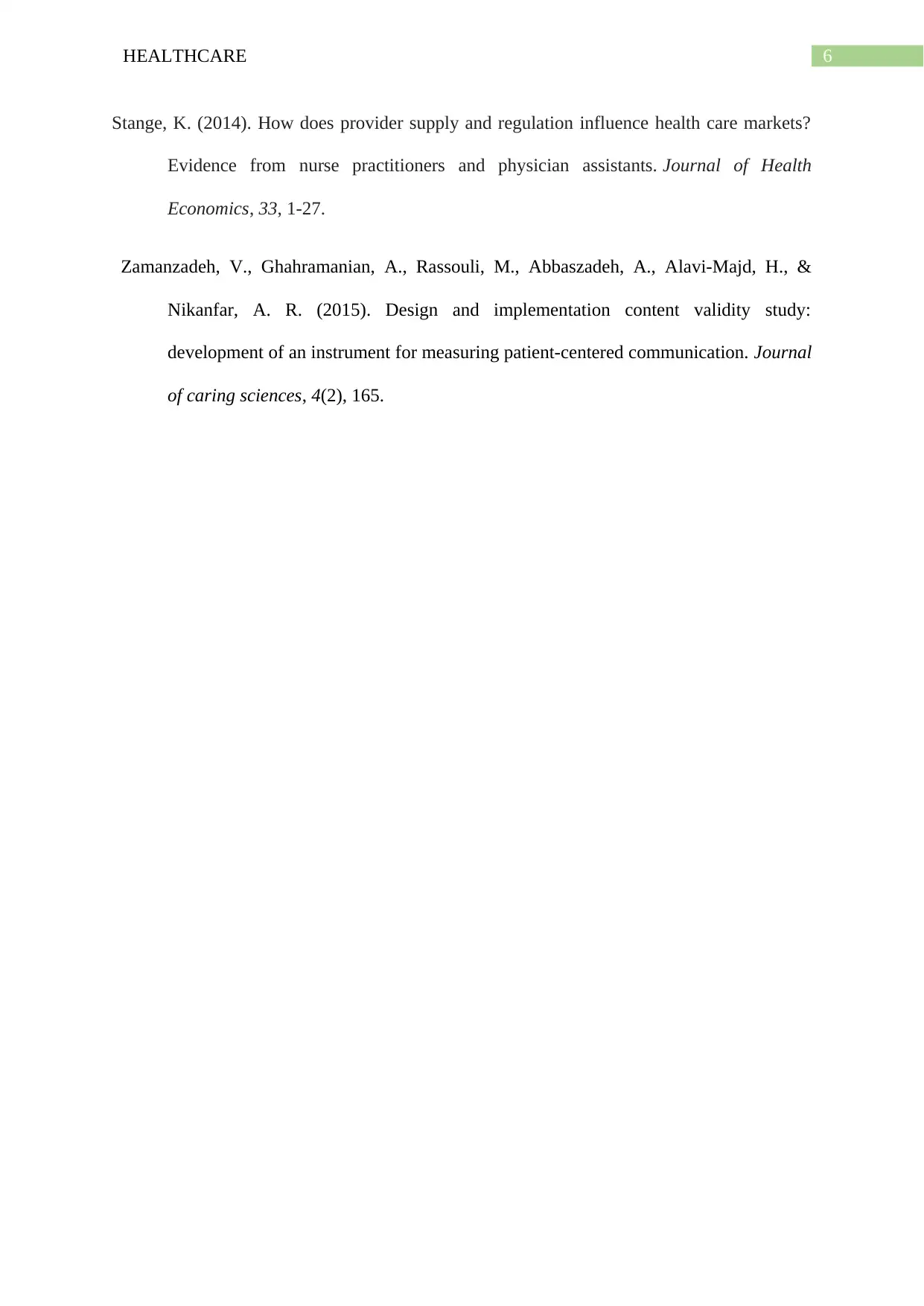
6HEALTHCARE
Stange, K. (2014). How does provider supply and regulation influence health care markets?
Evidence from nurse practitioners and physician assistants. Journal of Health
Economics, 33, 1-27.
Zamanzadeh, V., Ghahramanian, A., Rassouli, M., Abbaszadeh, A., Alavi-Majd, H., &
Nikanfar, A. R. (2015). Design and implementation content validity study:
development of an instrument for measuring patient-centered communication. Journal
of caring sciences, 4(2), 165.
Stange, K. (2014). How does provider supply and regulation influence health care markets?
Evidence from nurse practitioners and physician assistants. Journal of Health
Economics, 33, 1-27.
Zamanzadeh, V., Ghahramanian, A., Rassouli, M., Abbaszadeh, A., Alavi-Majd, H., &
Nikanfar, A. R. (2015). Design and implementation content validity study:
development of an instrument for measuring patient-centered communication. Journal
of caring sciences, 4(2), 165.
1 out of 7
Related Documents
Your All-in-One AI-Powered Toolkit for Academic Success.
+13062052269
info@desklib.com
Available 24*7 on WhatsApp / Email
![[object Object]](/_next/static/media/star-bottom.7253800d.svg)
Unlock your academic potential
Copyright © 2020–2026 A2Z Services. All Rights Reserved. Developed and managed by ZUCOL.





